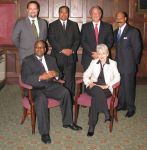For the past 19 months since the election of President Barack Obama, America has been buzzing over whether or not we now live in a “post-racial America.” At the closing panel discussion of the Race in America conference June 5, the four panelists answered that question with a resounding “NO.”
“I had predicted that the election of Obama was not going to be this momentous issue that the media made it out to be,” said Eduardo Bonilla-Silva, Ph.D., professor of sociology at Duke University. “If you look at the status of minorities nothing much has changed.”
 |
| RACE IN AMERICA PANEL—From left, back: Benjamin Jealous, Eduardo Bonilla-Silva, Alex Castellanos and Larry Davis. Front, from left: Tony Norman and Abigail Thernstrom.
|
Like many throughout the conference and even some on the panel, Bonilla-Silva argued that race relations might have actually become worse in some areas since the election.
“White folks have gained the upper hand because now they can say we have a Black president,” Bonilla-Silva said. “They’re ignoring race politics. We have to follow through with race-based politics to eliminate disparity.”
As the Republican Party’s most well known media consultant, Alex Castellanos, who served as the panel’s moderator, said Obama’s campaign was more of a symbol of the change many Americans would like to see instead of a realization of change.
“Such a large part of the last election is so many Americans wanted to take the country to a better place. The question now is, is it still there?” Castellanos said. “One of the good things about candidate Obama is he called people to do something bigger than themselves.”
Several of the panelists expressed disappointment with President Obama and his avoidance of directly addressing disparities in the African-American community and racism in general. In particular, Tony Norman, a Pittsburgh Post-Gazette columnist saw the incident where Harvard professor Henry Louis Gates was arrested as a teachable moment for Obama to show how racism is alive and well in America.
“When you look at what (Obama) has decided to go off on in the past months, he can’t exploriate power. He really doesn’t seem to have much of a stomach for battles,” Norman said. “When we elected a Black president, I thought we were going to elect a Black president.”
NAACP President Benjamin Jealous expressed many hopes for how the Obama administration could target the African-American community to decrease disparities. Chief among his disappointments was the lack of an African-American in Obama’s nominations for the Supreme Court.
“There are very serious concerns that have not been addressed,” Jealous said. “The good news is we have the greatest number of people in the country who are committed to a multiracial society than ever before. “
On the grander issue of whether the country should strive towards a “post-racial America” some panelists disagreed. The conversation became especially contentious around the issue of racially segregated schools. Jealous attributed many failures in the education system to the fact that schools are becoming desegregated due in large part to the segregation of social classes.
However, Abigail Thernstrom, a senior fellow at the Manhattan Institute, argued that Black students do not have to “sit next to” White students to learn and more emphasis should be placed on making the schools equal.
“We’ve got on average Black and Hispanic kids graduating from high school with a junior high educations,” Thernstrom said. “Should group differences entirely disappear, should that be our goal? No.”